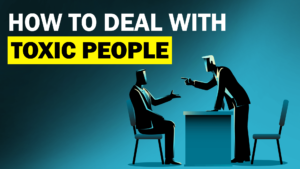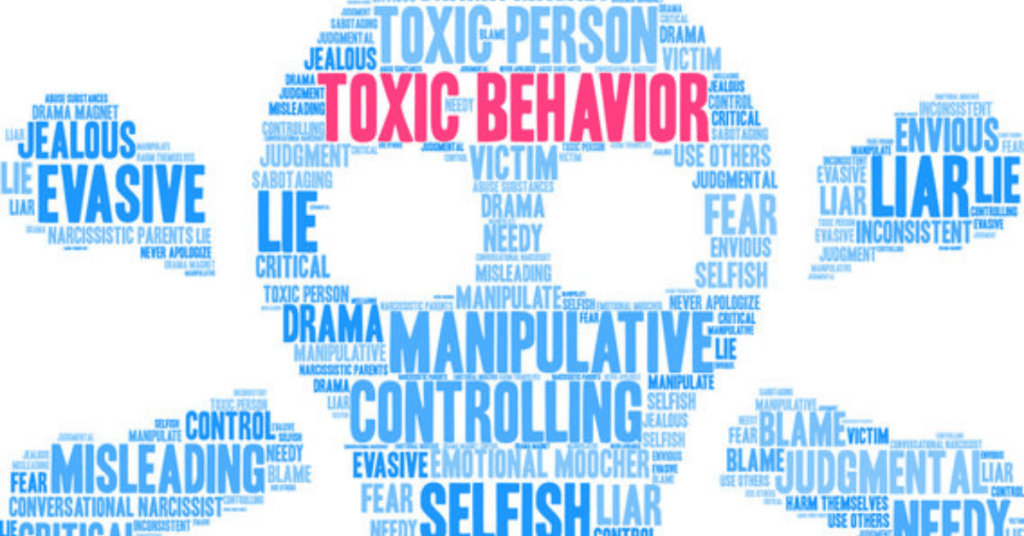Contents
What Is Toxic Behavior?

Toxic behavior is any form of negative, hurtful, or malicious behavior that threatens our safety or well-being. This can include both direct actions and indirect harm, such as manipulating someone through words or intimidation. The effects of toxic behaviors are also typically far-reaching, if not permanently damaging to the target. What are some ways to deal with toxic people in your life There are a few things that you can do to deal with toxic behavior? First, you should try to distance yourself from the person or situation that is causing you stress. You can also try to talk to the person about how their behavior is affecting you. If that doesn’t work, you can also seek professional help.
No one should have to put up with toxic behavior, and it is important to take steps to protect yourself from it. Remember that you are not responsible for the actions of others, and you have the right to protect yourself from harm. Don’t be afraid to stand up for yourself and ask for what you need. You deserve to be treated with respect and dignity.
Early Warning Signs Of Toxic Behavior
The first signs of toxicity should be recognized as a warning. Early recognition is a key factor in safeguarding against potential problems down the road. Any one of these signs should serve as a warning that toxicity could be present:

- Criticism or insults for no apparent reason
- Unreasonable or irrational demands on others
- Inappropriate, foul language and expressions
- Manipulative behavior
- Demanding and overbearing manner
- Turning what others say around on them in an effort to make them appear wrong
- Making assumptions about the motivations of others without any evidence
- The assumption is that one’s own perspective is superior and should be adopted by all. The individual feels that they are always right, even when their outlook contradicts the truth
Signs Of Toxic Behavior
It can be difficult to determine if someone is exhibiting toxic behavior, as it often depends on the situation and context. However, there are a few key signs that can help you identify if someone is acting in a harmful way.
Some common signs of toxic behavior include:

- Verbal abuse
- Physical abuse
- Emotional abuse
- Intimidation
- Manipulation
- Gaslighting
If you are experiencing any of these behaviors, it is important to reach out for help. You are not alone, and there are people who want to support you.
How Does It Affect You?
When you are dealing with someone who is exhibiting toxic behavior, it can be difficult to focus on anything else. The person or situation can be incredibly draining and stressful, often leading to physical and emotional health problems. You may find that you are unable to sleep, eat, or concentrate and that your work or school performance suffers. In extreme cases, the stress from the toxicity can even lead to thoughts of suicide.
When someone is exhibiting toxic behavior, it can have a negative impact on those around them. The person may be verbally or physically abusive, which can cause stress and emotional problems for those in the vicinity. The toxicity can also lead to problems in work or school performance.
It is important to remember that we are not responsible for the actions of others, but we do have a responsibility to protect ourselves from harm. If you are experiencing toxic behavior, it is important to reach out for help. You are not alone, and there are people who want to support you. It is important to realize that you are not alone in this. There are people who care about you and want to help. You deserve to be happy and healthy, and it is okay to ask for help. Don’t be afraid to reach out for support.
Helping Someone Deal With Toxicity

We can help those who suffer from toxicity by providing a safe and supportive environment for them to talk about their experiences. One way is to provide resources for them to use, such as books, articles, and websites. We can also connect them with therapists who can help them deal with the effects of toxicity.
These are some ways-
- Creating a safe and supportive environment
- Providing resources to help them deal with their toxicity
- Connecting certain individuals with therapists who can help them deal with the effects of toxicity
However, these are not the only ways to help someone who is struggling with toxicity in their life every individual is different and will respond differently to different methods of help. So it is important that we as a society take the time to learn about the different types of help that are available, and then provide that help to those who need it.
Ways To Deal With Toxic Behavior
Ways to protect yourself from toxicity, including not engaging or distancing oneself from the situation, seeking professional help, and setting boundaries for what they will tolerate
One of the most powerful ways to protect oneself from toxicity is by setting boundaries and not engaging with the people or situations that cause the toxicity. Another way to deal with toxic people and situations is to get help from a professional such as a counselor, therapist, and life coach. Oftentimes, they will be able to empower you with skills that can then be used on your own time in order to prevent further occurrences of their toxic behavior.
Distance yourself from toxic behavior

Distance yourself from people and situations that are toxic to you. Sometimes toxicity can be inflicted via the Internet, but it is sometimes difficult to separate yourself from a situation or person that has been deemed toxic. The best thing to do in this case is to create a distance between yourself and the source of your stress by either blocking them from your social media feeds, moving to a different room during an argument, and not engaging with them for the time being.
Stop engaging with toxic people
One of the best ways to stop toxicity from affecting you is by removing yourself from engagement with those who are being toxic to you. Whether they claim that their behavior is unintentional or not, it is up to you to protect yourself from their behavior. If the person is someone that you have to see on a daily basis, try to limit the amount of time that you spend around them or find ways to distract yourself during those times.
Don’t take things personally
Toxic people often target their venom towards others because it protects them from having to confront their own shortcomings and vulnerabilities. Attempting to gain self-worth by belittling or degrading others results in a loss of self-worth. Don’t take it personally if someone doesn’t want to talk. Toxic individuals are often unwilling or unable to engage in healthy dialogue because they are preoccupied with defending themselves from being exposed to the truth about who they are.
Focus on the things you can control

We cannot control how others treat us, but we can influence their behavior by our own actions. Inertia breeds contempt, so remain calm and in control of your emotions when dealing with toxic people. Remember that toxicity is a character flaw, not a reflection of other people’s flaws. Toxic individuals are unwilling to change, so don’t waste energy trying to reform them. Focus on the positive aspects of life instead of letting toxicity take up your time and mental resources.
Seek professional help
There are times when toxicity becomes too much for us to handle on our own and professional help becomes a necessity. In those cases, it is best to seek out the assistance of a professional such as a therapist, psychologist, and life coach. They will be able to give you advice on how to handle your situation and empower you with the necessary skills that can then be used in other parts of your life.
Setting boundaries
One way to deal with toxic behavior is by setting boundaries. Boundaries are limits that we put on our own behavior as well as the behavior of others in order to maintain our own mental and emotional health. When it comes to toxic people and situations, setting boundaries can help us to avoid their behavior altogether or limit the amount of contact that we have with them. Sometimes it is best to not engage with them until they are able to show respect and empathy towards us.
Ways To Deal With Toxic People

When you are dealing with someone who is exhibiting toxic behavior, it can be difficult to focus on anything else. The person or situation can be incredibly draining and stressful, often leading to physical and emotional health problems. You may find that you are unable to sleep, eat, or concentrate and that your work or school performance suffers. In extreme cases, the stress from the toxicity can even lead to thoughts of suicide.
There are a few things that you can do to deal with toxic behavior. First, you should try to distance yourself from the person or situation that is causing you stress. You can also try to talk to the person about how their behavior is affecting you. If that doesn’t work, you can also seek professional help.
No one should have to put up with toxic behavior, and it is important to take steps to protect yourself from it. Remember that you are not responsible for the actions of others, and you have the right to protect yourself from harm. Don’t be afraid to stand up for yourself and ask for what you need. You deserve to be treated with respect and dignity.
It is important to realize that you are not alone in this. There are people who care about you and want to help. You deserve to be happy and healthy, and it is okay to ask for help. Don’t be afraid to reach out for support.
Conclusion
The way people behave when they are in a deal-toxic state is different from the way they act outside of it. Deal toxicity can be caused by any number of factors, including feeling pressured to make a decision quickly or deciding that what you’re being offered isn’t worth your time. When someone has entered into this state, there’s no point trying to persuade them with logical arguments because their brain will have already made up its mind about whether or not something appeals to them. Instead, try using an emotional appeal and focus on how this opportunity makes them feel rather than focusing on why it might benefit others.
If you are looking for affordable Online Counseling MantraCare can help: Book a trial therapy session


